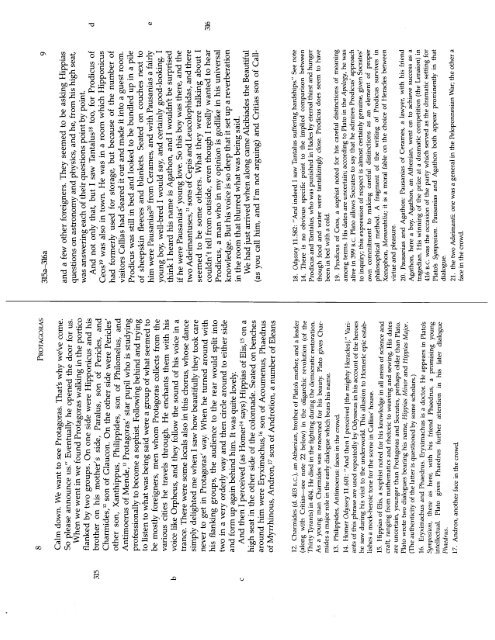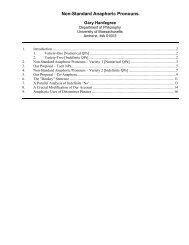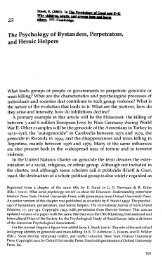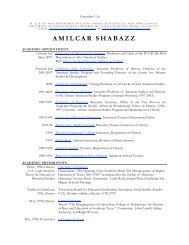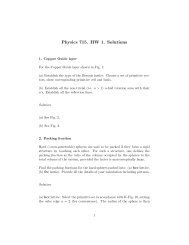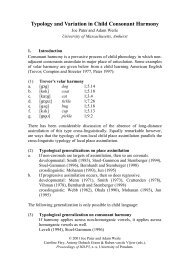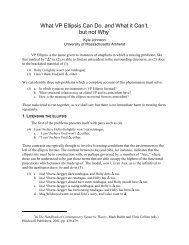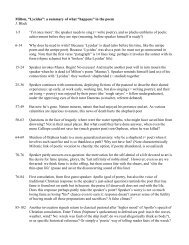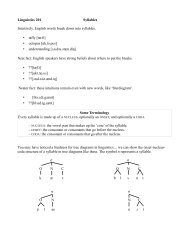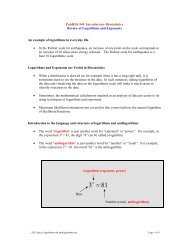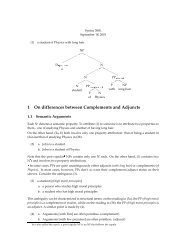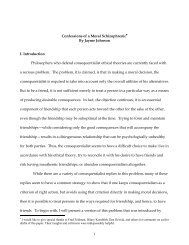Protagoras (PDF)
Protagoras (PDF)
Protagoras (PDF)
You also want an ePaper? Increase the reach of your titles
YUMPU automatically turns print PDFs into web optimized ePapers that Google loves.
d<br />
e<br />
316<br />
8 PR0TAG0RAs 315a—316a<br />
9<br />
Calm down. We want to see <strong>Protagoras</strong>. That’s why we’ve come.<br />
So please announce us.” Eventually he opened the door for us.<br />
When we went in we found <strong>Protagoras</strong> walking in the portico<br />
flanked by two groups. On one side were Hipponicus and his<br />
315 brother on his mother’s side, Paralus, son of Pericles, and<br />
12 son of Glaucon. On the other side were Pericles’<br />
Charmides,<br />
other son, Xanthippus, Philippides, son of Philomelus, and<br />
3 <strong>Protagoras</strong>’ star pupil who is studying<br />
Antimoerus of Mende,’<br />
professionally to become a sophist. Following behind and trying<br />
to listen to what was being said were a group of what seemed to<br />
be mostly foreigners, men whom <strong>Protagoras</strong> collects from the<br />
various cities he travels through. He enchants them with his<br />
b voice like Orpheus, and they follow the sound of his voice in a<br />
trance. There were some locals also in this chorus, whose dance<br />
simply delighted me when I saw how beautifully they took care<br />
never to get in <strong>Protagoras</strong>’ way. When he turned around with<br />
his flanking groups, the audience to the rear would split into<br />
two in a very orderly way and then circle around to either side<br />
and form up again behind him. It was quite lovely.<br />
5 on a<br />
4 says) Hippias of Elis,’<br />
c And then I perceived (as Homer’<br />
high seat in the other side of the colonnade. Seated on benches<br />
16 son of Acoumenus, Phaedrus<br />
around him were Eryximachus,<br />
and a few other foreigners. They seemed to be asking Hippias<br />
questions on astronomy and physics, and he, from his high seat,<br />
was answering each of their questions point by point.<br />
18 too, for Prodicus of<br />
And not only that, but I saw Tantalus<br />
9 was also in town. He was in a room which Hipponicus<br />
Ceos’<br />
had formerly used for storage, but because of the number of<br />
visitors Callias had cleared it out and made it into a guest room.<br />
Prodicus was still in bed and looked to be bundled up in a pile<br />
of sheepskin fleeces and blankets. Seated on couches next to<br />
2° from Cerames, and with Pausanias a fairly<br />
him were Pausanias<br />
young boy, well-bred I would say, and certainly good-looking. I<br />
think I heard his name is Agathon, and I wouldfl’t be surprised<br />
if he were Pausanias’ young love. So this boy was there, and the<br />
21 sons of Cepis and Leucolophidas, and there<br />
two Adeimantuses,<br />
seemed to be some others. What they were talking about I<br />
couldn’t tell from outside, even though I really wanted to hear<br />
Prodicus, a man who in my opinion is godlike in his universal<br />
knowledge. But his voice is so deep that it set up a reverberation<br />
in the room that blurred what was being said.<br />
We had just arrived when along came Alcibiades the Beautiful<br />
7 son of Androtion, a number of Eleans<br />
of Myrrhinous, Andron,’<br />
(as you call him, and I’m not arguing) and Critias son of Call<br />
18. Odyssey 11.582: “And indeed I saw Tantalus suffering hardships.” See note<br />
14. There is no obvious specific point to the implied comparison between<br />
12. Charmides (d. 403 B.c.), an Athenian, brother of Plato’s mother, and a leader<br />
(along with Critias—see note 22 below) in the oligarchic revolution (of the<br />
Thirty Tyrants) in 404. He died in the fighting during the democratic restoration.<br />
As a young man Charmides was renowned for his beauty. Plato gives Char<br />
mides a major role in the early dialogue which bears his name.<br />
13. Philippides, Antimoerus: faces in the crowd.<br />
14. Homer Odyssey 11.601: “And then I perceived [the mighty Heraclesi.” Vari<br />
ants of this phrase are used repeatedly by Odysseus in his account of the heroes<br />
Prodicus and Tantalus, who was punished in Hades by eternal thirst and hunger<br />
though food and water were tantalizingly close. Prodicus does seem to have<br />
been in bed with a cold.<br />
he saw during his visit to the underworld. This allusion to Homeric epic estab<br />
lishes a mock-heroic tone for the scene in Callias’ house.<br />
15. Hippias of Elis, a sophist noted for his knowledge in all areas of science and<br />
craft, ranging from mathematics and rhetoric to weaving and sewing. His dates<br />
are uncertain, younger than <strong>Protagoras</strong> and Socrates, perhaps older than Plato.<br />
Plato wrote two dialogues bearing his name, Hippias Minor and Hippins Major.<br />
(The authenticity of the latter is questioned by some scholars.)<br />
16. Eryximachus and Phaedrus. Eryximachus is a doctor. He appears in Plato’s<br />
Symposium, ther.e as here, with his friend Phaedrus, a promising young<br />
intellectual. Plato gives Phaedrus further attention in his later dialogue<br />
Phaedrus.<br />
17. Andron, another face in the crowd.<br />
19. Prodicus of Ceos, a sophist noted for his careful distinctions of meaning<br />
among terms. His dates are uncertain; according to Plato in the Apology, he was<br />
alive in 399 B.C. Plato allows Socrates to say that he admires Prodicus’ approach<br />
to inquiry; this expression of respect is almost certainly genuine, given Socrates’<br />
own commitment to making careful distinctions as an element of proper<br />
philosophical method. A fragment of the writing of Prodicus survives in<br />
Xenophon, Memorabilia; it is a moral fable on the choice of Heracles between<br />
virtue and pleasure.<br />
20. Pausanias and Agathon: Pausanias of Cerames, a lawyei with his friend<br />
Agathon, here a boy. Agathon, an Athenian, went on to achieve success as a<br />
tragedian. His winning of the prize at a dramatic competition (the Lenaion) in<br />
416 B.C. was the occasion of the party which served as the dramatic setting for<br />
Plato’s Symposium. Pausanias and Agathon both appear prominently in that<br />
dialogue.<br />
21. the two Adeimanti: one was a general in the Peloponnesian War; the other a<br />
face in the crowd.


